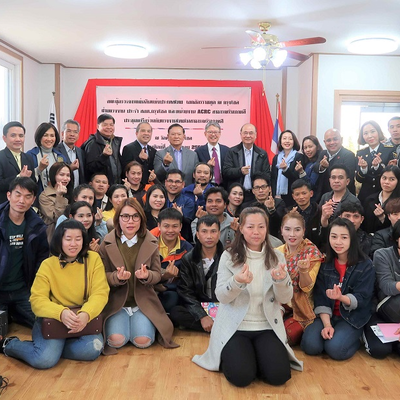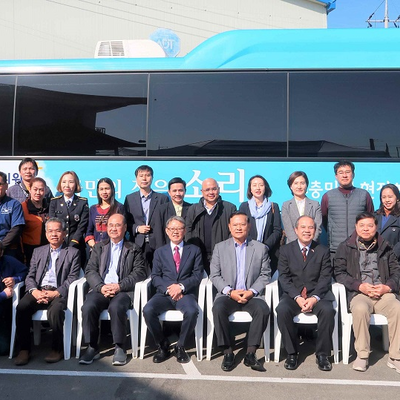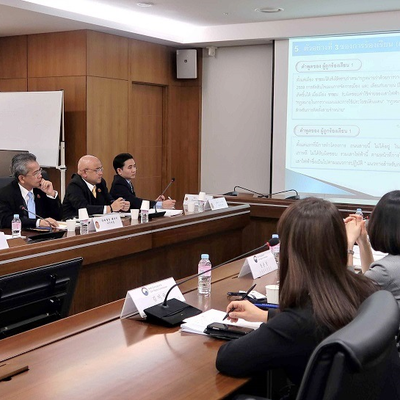During 15 – 19 March 2019, the Thai Ombudsman delegation led by the Chief Ombudsman of Thailand and Ombudsmen of Thailand (Mr. Boon Tapanadul and Mr. Somsak Suwansujarit) with the Secretary-General of the Office of the Ombudsman of Thailand inclusive of accompanied officials, visited the Republic of Korea to implement a Memorandum of Understanding (MOU) on bilateral cooperation between the Thai Ombudsman and the Anti-Corruption and Civil Rights Commission (ACRC) of Korea.
As a result of the visit, the Thai Ombudsman delegation participated in the meeting with Thai labours in the Republic of Korea (ROK), in association with Ambassador of Thailand (Mr. Singtong Lapisatepun), Labour Attache (Ms. Pinyuda Chamchansri), ACRC delegation led by Mr. Kwon Kunsang, Director-General of the Ombudsman Bureau and Thai labours in the ROK, at Wat Buddharangsee Seoul, Gyeonggi Province, to follow up on a redress of problems and inconveniences of the Thai labours in the ROK. Furthermore, the ACRC delegation was accompanied by its Mobile Complaint Service Bus (Mobile Shinmungo Bus) for receiving complaints of the participated Thai labours.
In addition, the Thai Ombudsman delegation and the ACRC delegation, led by Ms. Pak Un-jong, Chairperson of the ACRC held the Policy Meeting under the MOU between the Thai Ombudsman and the ACRC at the ACRC Office in Sejong City.
Apart from the meeting, the Secretary-General of the Office of the Ombudsman of Thailand was appointed by the Thai Ombudsman to be the head of the Office of the Ombudsman’s delegation for participating in the exchange of knowledge and experience regarding mediation cases.
Consequently, Mr. Kwon Kunsang, Director-General of the Ombudsman Bureau, and Mr. Kim Jae-hak, Investigator, Agro-Forestry & Environment Complaints Division, ACRC, provided information on a redress of complaint by mediation, which will be applied with collective complaints that impact society extensively and are relative to a numbers of agencies. Also, the ACRC illustrated 3 case studies regarding a reopening of public road unjustly closed by an industrial park, a location reservation for establishing medium and small factories in an industrial park which the industrial park did not provide any quota for medium and small factories in spite of a reservation plan, and a relocation of electric poles located in a middle of a road due to an expansion of a road with a complicated regulation.
Reciprocally, the Secretary-General of the Office of the Ombudsman of Thailand exchanged information regarding a role of the Ombudsman in alleviating grievances of citizens by applying principles of conciliation and settlement of problems, rather than emphasizing suspect finding and punishment. Furthermore, the Secretary-General provided 2 case studies to illustrate the aforementioned role of the Ombudsman of Thailand. The cases were an issuance of identification of a complainant which his status was modified illegally to be a deceased person by an official for a misuse purpose, and a modification of road construction to reduce impact to local citizens and a proper compensation for citizens whose lands and properties were affected by the construction.
Afterwards, the Secretary-General and Mr. Kwon Kunsang, had discussed policies for strengthening cooperation under the MOU in terms of working level cooperation. In this regard, the Secretary-General proposed activities regarding an exchange of knowledge and experience of working level officials via an exchange of officials of both organizations for study visit, joint research on topics relative to common interests, and joint training for officials of both Parties and other countries.
The Thai Ombudsman and the ACRC firstly signed the MOU in December 2011 and renewed the MOU twice in December 2014 and May 2018. The objective of the MOU is to strengthen institutional cooperative frameworks including protection of citizens of both Parties’ countries, improvement of complaint handling systems, exchange of knowledge and best practices, and redress of grievances of both countries’ citizens.
Source: Office of the Ombudsman, Thailand




